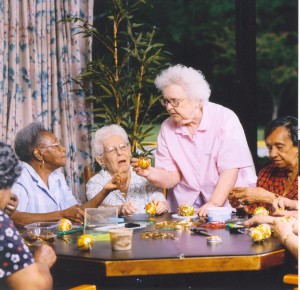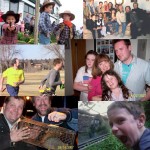I learned while visiting my Gpas nursing home that the gender ratio for single men in their 80s is many women vying for widowers like Custer made his last stand. My Kenyan brothers taught me never to race them again.
Nursing Home Rhapsody
“How’d you like…!” Floyd paused, trying to remember what he was saying. The water chestnut on his salad plate brought the lost line of thought back to his meandering mind, “How’d you like to only be allowed to have one kid!”
Gertrude scrunched her face into a raison of irritation. It was bad enough that her meatloaf was cold. And today she was just not in the mood for it. It was bad enough she had missed Wheel-of-Fortune because of damned Daylight Savings time. Plus all morning she had to listen to smug Mildred’s great grand scamper around the halls, not once shutting their flappers! How often did she need to remind people that she had lived through The Depression and The Second World War and had endured seven decades of wipper-snapping-hooligan young folks blasting their devil music?
Floyd took Gertrude’s scowling silence and chronically shaking head meant that she did not hear him, so he raised his voice even higher, “How’d you like the government telling you that you can only have one kid!”
Gertrude shook her head and glared at her tray of meatloaf.
“HOW’D YOU LIKE THAT? ONLY BEING ABLE TO HAVE ONE KID!”
“I wouldn’t like that one bit,” she muttered angrily stabbubg what could hardly be considered meatloaf. How did anyone expect those Mexican girls in the kitchen to know anything about makin’ meatloaf?
“Well then!” Bellowed Floyd, “Don’t move to China then! Because you can only have one kid in China!”
Floyd had been watching CNN and he was outraged at what those red communist bastards were doing over there. What kind of country did they think they were running anyways? “Because in China they only let you have one kid! JUST ONE!”
Gertrude brooded and mumbled, “I have no intention of moving to China, Floyd. Never have. Never will. I doubt a hillbilly from Missouri like you could even point it out on a map. I’ll give you a hint, go East until you fall off the world.”
Lunchtime ended and two volunteers came to wheel Floyd and Gertrude back to their solitary rooms. Gertrude swallowed tenuously when she saw that Chad, that new African boy was pushing her chair. She had heard he was a Muslim.
“How was your lunch Mrs. Baker?”
Gertrude huffed to herself, recalling her miserable excuse for a lunch. “I’ll tell you one thing,” she said holding up a halting finger, “ The devil will have his own skating rink the next time I sit with that fat, loud-mouthed Floyd again.”
“Well, I guess a good man is hard to find, eh?” Chad side smiling.
“None of the good ones make it past eighty.”
She suspected that very instant that her Donald was getting drunk in heaven with Saint Augustine and whistling at loosey-goosey Mary Magdalene. And here she was, perpetually wheeled from her closet-of-a-room to the dining room three times a day.
On the way back to his room, Floyd passed Chester and Philip in the hall. He tried to eavesdrop, but could not make out what they were murmuring to each other about. They both ran their fingers through their Santa Claus beards. Yesterday he had been part of their clique as the three of them had again plotted to write to their congressmen about this rat hole of a nursing home that refused to purchase a decent satellite sports package.
*
When she returned to his room, Gertrude shook with anger from what she had just read. He had even had the nerve to ask her in his letter not to mention it. Fat chance, she thought. I’ll teach him to tell me to meet him underneath the palm tree at Bingo! Just who did he think he was? She’d teach him to fall in love with her! Even though she had already decided to stay home, she was going to go to bingo that night. She had an earful to give to a certain troublemaker. And her mother had taught her plenty about steering clear of troublemakers.
“…Your snowy white hair reminds me of time spent underneath a warm blanket absorbing the hearth’s dancing fire of long ago Christmases…”
What indecorous, indecent stuff he had put into that ungodly letter. She was a lady and not some gutter raised vamp. Oh she would be at bingo tonight, he could count on that. And he better turn his hearing aids up.
She sat in her room all afternoon brooding and blushing. She glanced hesitantly at herself in the mirror, and for the first time in a long while looked at her white, colorless hair and saw a distant twinkle in her eyes. She frowned at herself and tried to see what all the fuss was about. It’s just me. Just plain old Gertrude Baker here. She looked at herself like she had not looked at herself in years, and without really knowing what she was feeling, she thought about herself in an old way that suddenly felt new. For a moment she saw herself as a living, breathing woman with weeks, maybe even months or years still in front of her.
Her children thought she had lost her marbles. She saw it in their eyes. She saw the way their eyes spoke to each other during their monthly visits. She saw the way their youthful eyes left her out of the conversation. She wasn’t dead yet—even if everyone was just waiting for her to be sleeping in a box.
They thought she just sat around in her chair all day and watched TV. Ha! What did they know about the love letter she had in her hands? Not nothing! There weren’t many men left in this place, but the ones here all seemed to have their eyes on her. =
Before a smile could creep up on her earthbound lips, she winced and turned away.
*
Floyd’s mail had already been placed on his plywood table. Social security check, junk mail, glossy magazines with type too small to even read—the usual garbage. He set his check aside and wheeled over to the garbage can. Just before he threw the bundle of unopened solicitations and catalogues away, he noticed a letter in a dark green envelope that did not belong with the rest. There was no stamp or address on it, but his name, Floyd Edmond, was printed prominently on the front. What’s all this about? He thought to himself as he wheeled his chair back over to his table. He turned on the lamp and pulled out his magnifying glass.
Dear Floyd,
I have fallen deeply and madly in love with you. We don’t have a lot of time, as my doctors do not have much good news for me these days…
Ha, those young doctors did not know their left hand from their right!
…Your sexy, shiny head, smart glasses, your brilliant insights into current affairs and eloquently pattered polo shirts are simply not something I can resist any longer. If you feel the same way about me, come to Bingo tonight. Don’t mention this letter. Just ask to be wheeled to the table in the back, next to the fake palm tree.
Your no longer secret admirer,
Gertrude Baker
Well I’ll be damned, thought Floyd, that minx! She had always been so quiet. It’s always the quiet ones Floy, he remembered his older brother had told him half a century ago.
Floyd caught looked past the letter and saw his blurry reflection in his lacquered coffee table. Rarely was there time these days to pause and think When he let his mind wander it would inevitably think about the people he missed. He was the youngest of seven brothers, and the only one still alive. He envied them. They would not be coming to his funeral, and he had to go to theirs. It wasn’t fair. Who would come to his?
*
When he has children of his own, he really will be able to tell them that when he was a kid he walked an hour in barefoot everyday to get to school. Study, study, study—his mother’s mantra—was still the tempo he set his life to.
His own family’s fears about him studying in America now seemed unfounded. Sure, racism existed in The United States, but where else had so many haphazard souls found such harmony? In Chad’s native Kenya, the discrimination of urban against rural, of one petty tribe against another, was much realer than the receding remnants of racism found here in The States.
He worked 30 hours a week as a dishwasher and took 18 credit-hours of classes. But here at the nursing home, he was a volunteer, giving 10 weekly hours that perhaps could be better spent studying. He originally came here out of a karmic tug to repay the country that had given him the university scholarship he had worked his whole life for.
But now he knew he came here to learn. Even if the graying people here were mostly forgotten to the world, they knew this country’s history and were willing to tell anyone who was willing to listen. He learned more here on some days than he did during weeks in his American history class.
They had pasts, not futures. They had lost who they had loved. And what is the future for if not to discover love?
And the same karmic tug that brought Chad here soon made him feel that pushing their wheel chairs from one place to another was not enough. He needed to give them something more. He watched them and tried to see what they lacked.
For weeks Chad had been pensively pushing around their chairs while he tried to solve the riddle. It came to him one day as he thought about the butterflies in his stomach at getting a girl’s phone number at the gym he never had time to work out in.
Susan was her name. He always smiled whenever he saw her there. For weeks he was afraid to talk to her. Then he said “hello” when their paths crossed. Finally, he had asked for it, and she gave it to him. Just like that! He was grateful for the dark skin that hid the blush he felt as she spent an eternity scrawling seven digits on a scrap of paper. He had not called her yet, but the possibility of doing so gave the morning its smell, and the sunset its glory. It gave life a fiery meaning. Who knew where things would go? Who knew what could happen? It was the possibilities that painted life a beautiful colors.
.
*
“B6…B6…B6”
“What?”
“Tree dick? Did he say, ‘tree dick?’ That’s not a bingo number!”
“Speak up son.”
“Use your big-kid voice!”
“He’s not even using the microphone! What’s the point of having a microphone if you ain’t gonna even use it?”
“B6! The letter B, as in bi-iiingo, and the number si-iiix.” John held up six fingers and shook his head. If you’re deaf, then maybe bingo isn’t our sport, he thought. He looked out at the sea of squinting faces, looking slowly up from their cards to him as he pulled the balls out of the rotating cage.
“B6! Everyone got it? Okay, next number…” John was having trouble suppressing the profanity that usually flooded his vernacular.
He overheard an exhaustingly familiar voice from a table in the front row, “It did sound like he said ‘tree dick’, didn’t it?”
He sighed and pulled another ball. This was a bullshit assignment. The court had given him several options for the 120 community service hours he owed the state. He could be picking up garbage on the highway, scrubbing graffiti off government buildings, repainting a grade school, or a half dozen other things that now seemed much better than, watching old people drooling on themselves, arguing with him in their disappointment when someone else got a bingo when they were just one number away?
Just one away? Well too bad Bingo is a complete line or a complete blackout, or all four corners. A partial line, three corners, and an incomplete blackout did not get you jack. He didn’t make up the stupid rules of Bingo. What did they want him to do about it? And the prizes? They were crap prizes—a box of gram crackers, some Christmas stickers (it was July), some fake flower center pieces, bags of jelly beans, and the grand frickin’ prize, a stationary set complete with a pens and pencils. Woopty-fricken-doo!
John held the ball in his hand and looked out at the card tables set up in the activity room. This was his 5th night running Bingo and he noticed something different this time. There were still loads of raison-faces scowling at their bingo cards, their little worlds defined by which ball got lodged in the cage’s chute, but something new, exciting was in the air.
Some people weren’t straining to hear him. A handful of tables were filled with couples who didn’t seem to even be marking their cards. Why now didn’t they care about the bags of jellybeans at stake? John pondered until—
“—Are you gonna take that bingo ball out to a nice dinner or are you gonna read the number off her to us?” A voice in the front row brought him back.
John looked at the ball in his hand and in a firm, clear voice read, “O54. O54!”.
*
“O54!”
Audiologists tell us that we can hear over 150 different sounds at any given time. And of those sounds, we can only focus on a few. We choose which sounds we hear, which ones we focus on, and which ones get lost to the forgotten background. Floyd never heard O54 being called.
His card had the number. Had he been paying attention, he would have known that his card had actually scored a bingo four numbers ago. He would have found his card was on a hotter streak than his record of four Bingos at the Amvets—the night he had driven home wildly to hand his wife the $500 he had pocketed when his card hit the jackpot in the blackout round.
*
“O54!”
Gertrude had spent the afternoon preparing a harsh speech that she never delivered to Floyd. Sitting underneath the plastic palm tree, she felt like she did when she was seventeen on a family vacation in Miami Beach. Three weeks before this last-minute vacation, a uniform clad naval officer had knocked on her family’s front door. War letters from her older brother would no longer arrive to her trembling hands.
Donald, who she met that day in Miami Beach when she helped rescue his football from the surf, was there spending his last day on the sands of his hometown before he shipped off. He laughed when she had tried awkwardly to throw him back his ball.
“Not like that,” he had said, smiling wide. “Let me show you.”
They spent the rest of the day together, and for the rest of WWII, even though her brother’s letters no longer arrived, she still stalked the mailman. She knew his whole route, and was perpetually bumping into him. “Anything for 515 Richmond ST? A letter for me?” Her heart had always skipped a beat when the mailman handed her something.
Then it happened, beneath the nursing home’s plastic palm. At first, she thought Floyd was reaching to cover a Bingo number. Her eyes glanced at his card and she saw that even his freebie square was uncovered.
Floyd was not reaching for a number. His wrinkled, trembling hand reached out and touched her papery skin. That old feeling of a letter arriving made her heart feel like it was bleeding again and as their hearts sent extra blood to deal with these resurrected feelings, their cool hands began to warm.
Gertrude’s eyes slowly met his and both knew they were thinking a similar, single thought that somehow spanned both backwards and forwards.
*
Chad had never been to Bingo night before. He had begged Florence, a line cook, to work his dishwashing shift for him so he could stop by. He needed the money, a little for himself and the rest he always sent home to his family in Africa. But sometimes, people need things even more than the things they need for survival. Chad needed to witness this night.
From the entrance he noted the tattooed teenager announcing the numbers. Silently he watched everyone seated before their cards—half in wheel chairs, others with canes and walkers leaning against their tables. He was scanning the room for certain faces and carefully reading their expressions, taking note of who had come and who was next to who. He searched certain faces for a certain expression.
He noted a few shaky hands reaching for trembling fingers and before he was seen he walked out into the humid, night air towards the bus stop. His white smile reflected the glare of the streetlights. He saw nighttime insects swarming around the lights and was certain that, if not love, something very similar impelled them towards the light. His thoughts jumped from memories of a dirt-floor hut in Africa, to the distant classrooms that had led to present possibilities, to Susan’s phone number carefully hidden in his wallet, to his little brother who was now able to go to school because of the money he was earning as a dishwasher. His little brother’s night had already surrendered to a bright Kenyan morning and he imagined him filling his backpack with books and his mother packing him a lunch. Everything that night—even the lost cries of dogs howling at a splinter of the moon—seemed to fit perfectly in its place.






